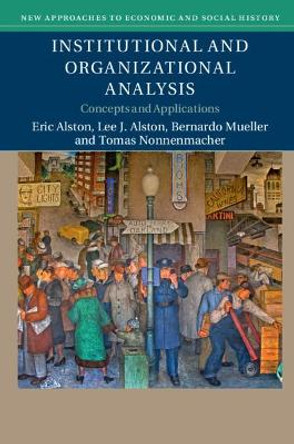Description
Why isn't the whole world developed? This toolkit for institutional analysis explains how rules affect the performance of countries, firms, and even families.
About the Author
Eric Alston is a Scholar in Residence in the Finance Division and the Faculty Director of the Hernando de Soto Capital Markets Program in the Leeds School of Business at the University of Colorado Boulder. He also serves as a Research Associate with the Comparative Constitutions Project. Lee J. Alston is the Ostrom Chair, Professor of Economics and Law, and Director of the Ostrom Workshop at Indiana University. He is a Research Associate at the NBER. Alston is Past-President of the International Society for New Institutional Economics, and the Economic History Association. Bernardo Mueller is a lecturer at the Department of Economics at the University of Brasilia. He is the co-author of Brazil in Transition: Beliefs, Leadership, and Institutional Change (2016), along with Lee J. Alston, Marcus Andre Melo, and Carlos Pereira. Tomas Nonnenmacher is the Patricia Bush Tippie Chair of Economics and the Co-director of the Center for Business and Economics at Allegheny College, Pennsylvania. He is an affiliated faculty member at the Ostrom Workshop.
Reviews
'These four intrepid authors develop a theory of institutional and organizational analysis of enormous ambition. Influenced by Buchanan, Coase, North and Ostrom, and Williamson, they work on a broad tapestry that crosses continents, spans centuries, and yet always maintains its focus on which set of arrangements flourish and which flounder.' Richard A. Epstein, New York University, The Hoover Institution and University of Chicago
'As a rule you can only synthesize an academic field when it is moribund. This book is the exception that proves the rule; it manages to bring together the most important ideas in institutional economics in a way which not only shows how intellectually vibrant it is, but which also opens up new research agendas. There is no better introduction.' James A. Robinson, University of Chicago
'This comprehensive introduction to the study of institutions and organizations approaches the question I have long considered in my own work: which set of institutions are most conducive to economic development? These authors provide an excellent synthesis of this essential field of study for students and scholars alike.' Hernando de Soto, Institute for Liberty and Democracy
'This is the book we've been waiting for - a comprehensive, comparative, interdisciplinary tour of the key concepts and most significant arguments that define modern political economy. The authors have assembled a remarkable volume of scope and content. It belongs on every scholar's shelf and in every student's hands.' Kenneth A. Shepsle, Harvard University
'This is a wonderful book - broad in scope (institutions, norms, organizations, and contracts), in disciplines (economics, political science, law, and history), and in methodologies (classic informal arguments, summaries of recent formal models, and incisive case studies). So many problems of collective action, productivity, development, and growth find almost no expression (not to mention solution) in neoclassical analyses of markets; Institutional and Organizational Analysis offers a way forward.' Robert Gibbons, Sloan School of Management, Massachusetts Institute of Technology
Book Information
ISBN 9781107086371
Author Eric Alston
Format Hardback
Page Count 406
Imprint Cambridge University Press
Publisher Cambridge University Press
Weight(grams) 670g
Dimensions(mm) 235mm * 157mm * 26mm









